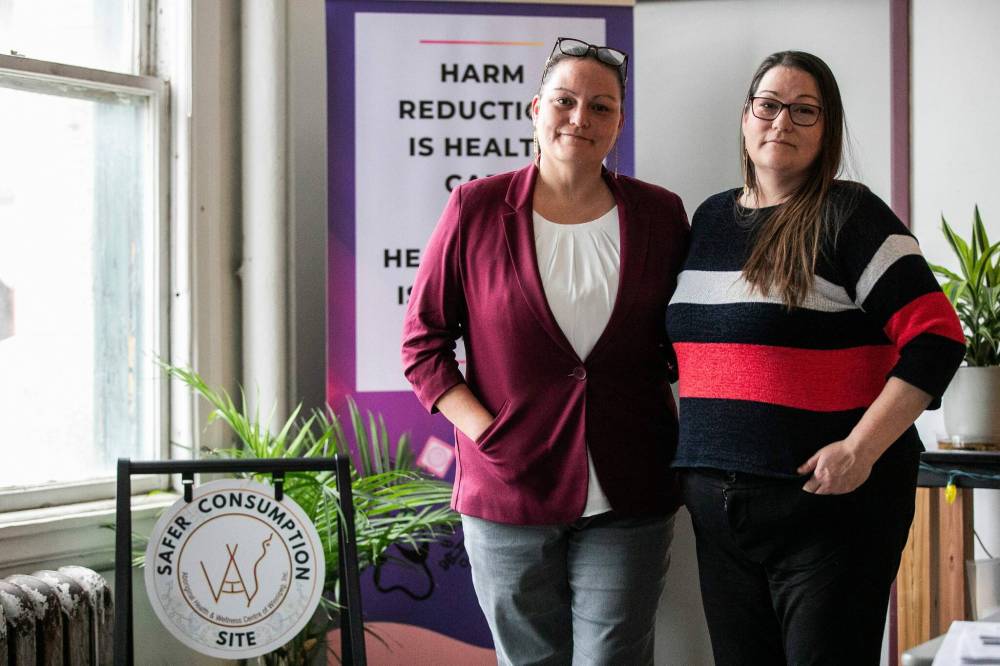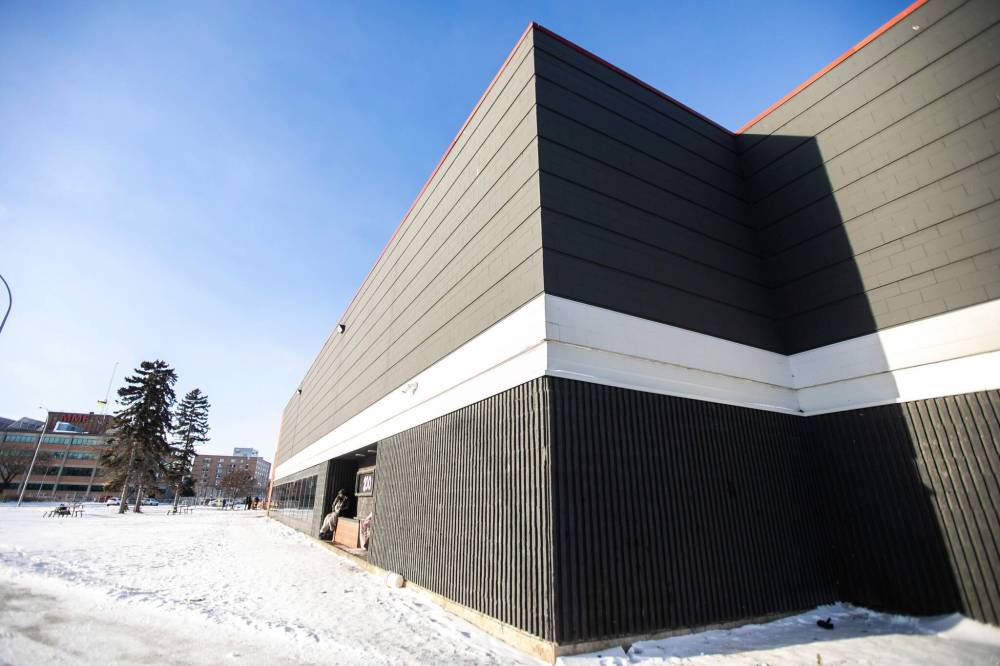Supervised drug consumption site organizers try to turn down the heat Organizers address concerns over proposed Disraeli Fwy spot
Read this article for free:
or
Already have an account? Log in here »
To continue reading, please subscribe:
Monthly Digital Subscription
$1 per week for 24 weeks*
- Enjoy unlimited reading on winnipegfreepress.com
- Read the E-Edition, our digital replica newspaper
- Access News Break, our award-winning app
- Play interactive puzzles
*Billed as $4.00 plus GST every four weeks. After 24 weeks, price increases to the regular rate of $19.00 plus GST every four weeks. Offer available to new and qualified returning subscribers only. Cancel any time.
Monthly Digital Subscription
$4.75/week*
- Enjoy unlimited reading on winnipegfreepress.com
- Read the E-Edition, our digital replica newspaper
- Access News Break, our award-winning app
- Play interactive puzzles
*Billed as $19 plus GST every four weeks. Cancel any time.
To continue reading, please subscribe:
Add Free Press access to your Brandon Sun subscription for only an additional
$1 for the first 4 weeks*
*Your next subscription payment will increase by $1.00 and you will be charged $16.99 plus GST for four weeks. After four weeks, your payment will increase to $23.99 plus GST every four weeks.
Read unlimited articles for free today:
or
Already have an account? Log in here »
Hey there, time traveller!
This article was published 05/12/2024 (327 days ago), so information in it may no longer be current.
The organizers of Canada’s first Indigenous-led supervised consumption site say the planned space will have “relationship-building” security, the capacity to treat hundreds of people a day and a constant cycle of community input.
The Aboriginal Health and Wellness Centre of Winnipeg held an informational meeting Thursday after news broke of the site’s proposed location at 200 Disraeli Fwy., just east of Main Street, in hopes of responding to some concerns from critics, who have suggested the space would make the surrounding area — including an alternative high school and child-care centres — less safe, and called out the province for moving forward on the plan without completing a full community consultation.
Charlene Hallett, AHWC’s supervised consumption site cultural and health integration lead, said if the site receives federal approval and plans move forward, the facility will employ community wellness workers who will act as greeters, clean up any discarded needles or other paraphernalia on the outskirts of the building and “keep the peace.”

There will be security inside the building, but ideally, police presence will be kept to a minimum in hopes of encouraging people to use the space.
“We want people to come in,” Hallett said.
“The more police you have outside in a very visible way could possibly decrease the amount of participants who want to come inside. And what we know from working here for 30 years with our constituents and having security at the door is, hugely, it’s about how you build relationships to begin with.”
Community spaces, including their own, already use this model of security in the Point Douglas area, Hallett said, and it is built to focus on the people most likely to experience violence in the area, who are usually homeless and otherwise vulnerable.
“So many people talk about safety, we agree, but I very rarely hear in those conversations safety about our constituents, safety about our relatives on the street, because they are actually more likely to experience violence perpetrated on them than someone who doesn’t live on the street,” she said.
There are ongoing discussions relating to capacity; as it stands, the facility could see up to 223 people each day. The space will also include an expanded version of AHWC’s drop-in Rapid Access to Addictions Medicine, used by more than 2,000 people last year.
Housing the clinic and the supervised consumption site in the same building will allow people who are ready to receive treatment for substance use to move directly from one space to the other, Hallett said.
“The misconception is that there was no discussions with us…. That’s not true.”–Monica Cyr
“We want to be able to just literally walk them up, rather than say, ‘Well, maybe we’ll call and maybe you can get in’ — let’s just go,” she said.
The intention is for the facility to include a mental-health team, a primary-care clinic and people on staff to provide support with basic needs, including housing.
Monica Cyr, AHWC’s senior director of clinical operations, said “misconceptions” around what the site will look like have influenced discussions around safety and the government’s consultation process.
Cyr said the proposed location was selected after months of consultations with a “community cohort” of organizations, a group of elders and a peer-advisory council of more than a dozen people who either use substances or have lived experience with substance use and live in the surrounding area.
“I think that’s the misconception is that there was no discussions with us, and that there’s going to be no discussions with us. That’s not true. That’s not true, at least not from AHWC’s perspective,” Cyr said.
“But we can’t engage the downtown Point Douglas (entire area) within 30 days. We can’t do that. Nobody can do that.”

Several groups, including the Manitoba Métis Federation, told the Free Press Tuesday they were not consulted on the proposed location. Progressive Conservative housing critic MLA Carrie Hiebert said she has heard from neighbours who say they were left out of the process.
Cyr said day-care centres and Argyle Alternative High School — a low-enrolment Grades 10-12 school with flexible courses and specialty programs aimed at preparing students for work or post-secondary education — were consulted. This time last year, the school located at 30 Argyle St. had about 150 registrants.
The majority of students self-identify as Indigenous — 66 per cent, per the latest public demographic report, and the school provides opportunities for youth and young adults to participate in First Nations, Métis and Inuit cultural activities, alongside academic lessons.
Jordan Bighorn, executive director of the Community Education Development Association, said the location can have a positive effect on the area.
“If it means that the community at large will find better health, if it means it embraces neighbours who are suffering with this addiction.”
There are no Argyle students who are currently active participants in CEDA’s academic enrichment programs, but young adults have accessed the organization’s after-school programs in previous school years.
“When I think of a drug den, I do not think of a clean, clinical space with nurses, with other support services around.”–Charlene Hallett
For Bighorn, the school’s location could prove to be symbolic. A glance across the street may lead people accessing the supervised consumption site – which he said will, essentially, replace an unsupervised one — to think about their relationship with the education system and how they can enhance their skills and find employment.
“It’s finally nice to have some of that tangible turnaround on these longstanding issues that community bears the brunt of, both in life as they’re living, but in death as well, because it happens so often and there’s such grief and compounded grief,” he said.
Federal Conservative Leader Pierre Poilievre has said he would close all supervised drug consumption sites near schools if he becomes prime minister and has referred to them as “drug dens.”
Hallett said the potential of a Poilievre-led government isn’t having an impact on AHWC’s work at the moment, but suggested that politicians at every level were contributing to the misinformation that has raised the temperature of the conversation about the province’s first supervised consumption site.
“When I think of a drug den, I do not think of a clean, clinical space with nurses, with other support services around, with access to showers and access to digital equity and access to all the other supports that will be there,” she said.
“I wish that all politicians, truthfully, would speak to it more in the health way that it is, and in the health crisis that it is, rather than simply trying to politicize it for points.

“It’s so unfortunate because people are dying, and you’re misinforming the Canadian citizens of what is actually the issue here.”
— With files from Maggie Macintosh
malak.abas@freepress.mb.ca
Emergency services consulted
The Aboriginal Health and Wellness Centre of Winnipeg has held meetings with the Winnipeg Police Service and Winnipeg Fire and Paramedic Service on how to best organize Manitoba’s first supervised consumption site.
“Overwhelmingly, these organizations are saying, ‘Yeah, we’re we’re here to help,’” said Monica Cyr, AHWC’s senior director of clinical operations.
One paramedic told the Free Press that emergency responders are often called to the immediate and surrounding areas.
Multiple paramedics in the Winnipeg Regional Health Authority have suffered life-altering injuries in recent weeks as a result of violent altercations fuelled by drugs, he said, adding that the status-quo is not sufficient for patients or the people treating them.
“Effectively, we have ‘unsupervised consumption sites’ concentrated around the shelters but it’s everywhere in our city,” said the paramedic, who agreed to an interview on the condition of anonymity for fear of retribution at work.
“People will associate, especially meth, but also opiates, with homelessness and lower socio- economics, but as a paramedic, I see every aspect of society. Every corner of the city is affected by this.”
— Malak Abas, with files from Maggie Macintosh

Malak Abas is a city reporter at the Free Press. Born and raised in Winnipeg’s North End, she led the campus paper at the University of Manitoba before joining the Free Press in 2020. Read more about Malak.
Every piece of reporting Malak produces is reviewed by an editing team before it is posted online or published in print — part of the Free Press‘s tradition, since 1872, of producing reliable independent journalism. Read more about Free Press’s history and mandate, and learn how our newsroom operates.
Our newsroom depends on a growing audience of readers to power our journalism. If you are not a paid reader, please consider becoming a subscriber.
Our newsroom depends on its audience of readers to power our journalism. Thank you for your support.





